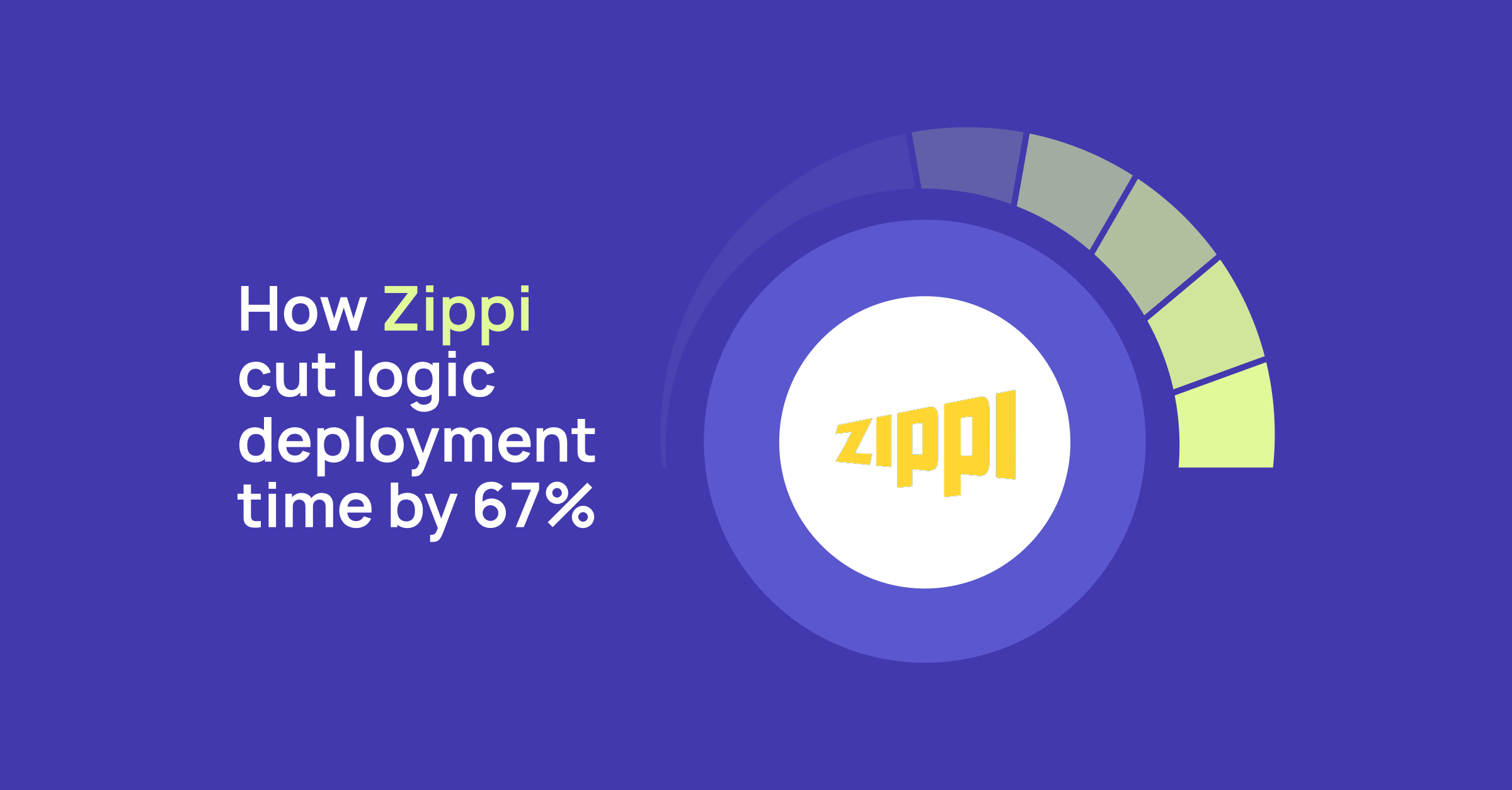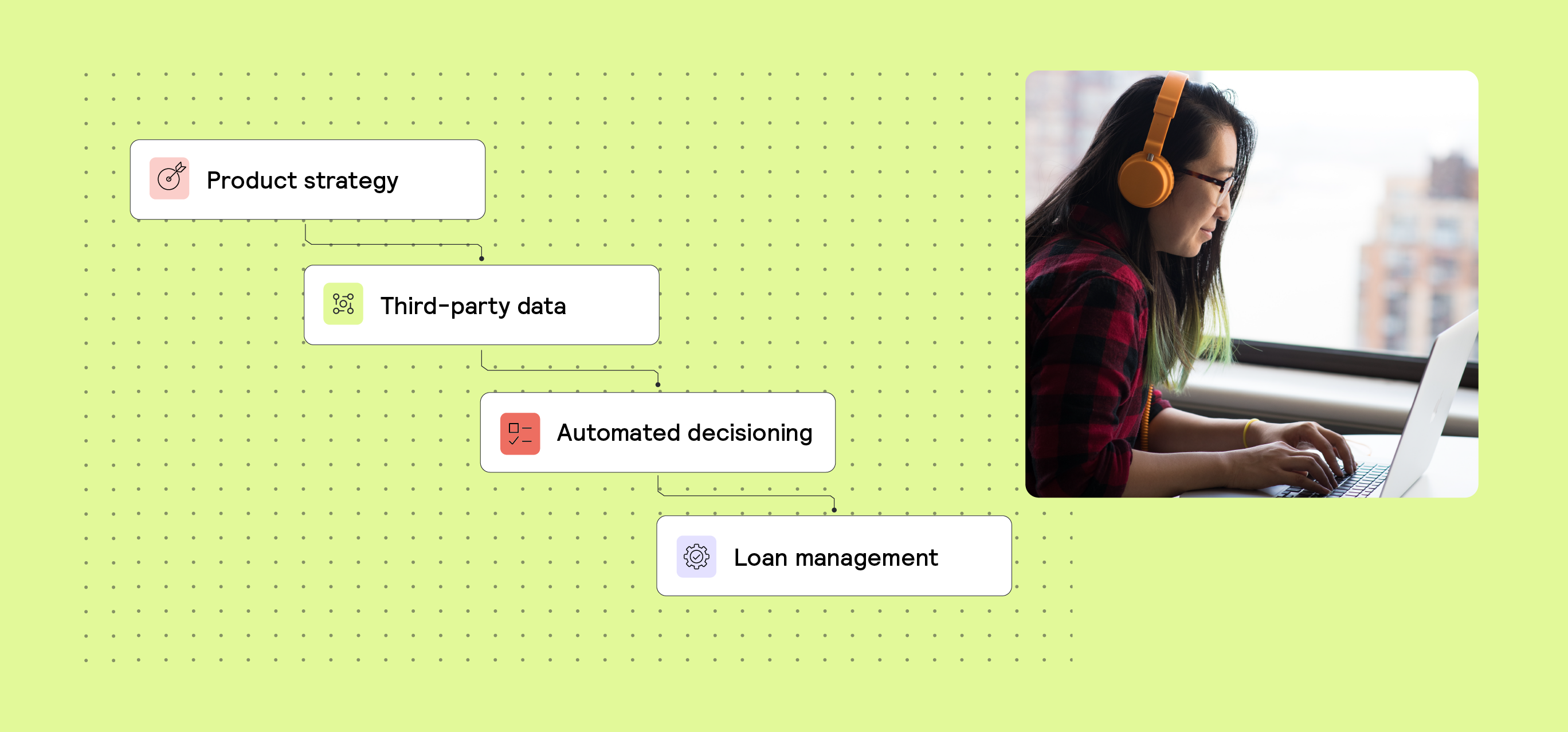B2B, Case Study 4 min read
Empowered teams, immediate results: How Zippi replaced legacy systems and cut risk logic deployment time by 67%

Key takeaways
Zippi, a fintech championing financial inclusion for Brazil's micro-entrepreneurs, turned to Taktile to replace its legacy systems and scale its risk management processes. By adopting Taktile's decision platform, Zippi achieved:
- 67% faster policy logic deployment: Accelerating the journey from testing to production, enabling rapid iteration and faster innovation.
- 100%+ increase in experimentation frequency: Conducting targeted experiments across fraud, credit, and portfolio workflows to refine strategies and optimize offerings.
- Real-time, scalable decision-making: Eliminating performance bottlenecks to ensure reliable, latency-free decisions, even at scale.
- Complete risk infrastructure consolidation: Unifying fraud, credit, and portfolio decision-making onto a single platform, fostering collaboration and transparency across teams.
These improvements have empowered Zippi to innovate at speed, scale operations confidently, and better serve the underserved community in Brazil.
Meet Zippi: Reinventing credit for Brazil’s micro-entrepreneurs
Built on the foundations of Brazil’s Central Bank-led innovation, Zippi provides working capital solutions that empower micro-entrepreneurs. Using PIX, Brazil’s real-time payment system, Zippi offers weekly billing cycles aligned with customers’ income streams to support business growth.
Processing over tens of millions of USD monthly and planning to grow 2x this year, Zippi is expanding access to financial services for underserved communities across Brazil – breaking decades of financial exclusion for small business operators.
The opportunity: Moving on from legacy limitations to enable sustainable, scalable decision-making at scale
A primary driver of Zippi’s product success is its innovative use of proprietary and external data combined with advanced risk modeling logic to onboard and price customers.
Initially, Zippi managed its fraud, credit, and portfolio monitoring strategies through separate infrastructure solutions, meaning teams worked in different systems to build, adjust, and monitor automated decisions. While siloed workflows are typical across different risk management use cases, Zippi’s fraud and credit teams encountered overlapping challenges with their existing systems:
- Limited usability for non-technical team members:
All systems were heavily code-dependent and inflexible. The credit and fraud monitoring engines required engineering expertise for minor adjustments. This made it difficult for non-technical team members to contribute to or collaborate on decision-making logic. - Performance bottlenecks:
Zippi’s fraud logic is highly customized and integrates with multiple external data providers tailored to its customer segment. However, their fraud infrastructure struggled with this complexity, lacking the capacity to process large data volumes, which hindered decision performance. - Limited iteration and testing capabilities:
Because the risk team relied on other teams for help with testing, it took longer to get experiments up and running. This meant fewer experiments were done, and it took longer to learn from them.
To grow their customer base and work more efficiently, Zippi’s risk teams needed a decision engine that could handle multiple risk use cases with ease. They also wanted a solution that let everyone on the team tweak and adjust policy logic without relying on the engineers.
"With connections to multiple data providers, our setup began to slow down as we scaled—challenging our time-to-decision, which is crucial to maintaining our competitive edge," said Júlia Crnkovic, Credit & Fraud Lead at Zippi. "And on top of that, both the fraud and credit teams really needed more freedom to tweak decision logic and test new rules on their own."
The innovation: One solution to scale complex decisions and unlock rapid innovation
To overcome the limitations of their existing legacy systems and enable greater scalability, Julia and her team chose Taktile’s decision platform for its fraud, credit, and portfolio monitoring use cases. By unifying these processes into a single, centralized platform, Zippi unlocked several benefits for its fraud and credit teams:
1. An effortless decision authoring experience for the non-technical user
Zippi’s credit and fraud teams can now build, test, and adjust decision flows on Taktile’s no-code interface—all without needing help from technical experts.
Furthermore, they can now visualize the path of every decision in real time. This enhanced visibility has been transformative for the team, enabling them to quickly identify potential errors and gain actionable insights into why specific decisions were made.
"Being able to inspect and resolve errors quickly has made a big difference for us. We’ve also found that even complex tasks, like integrating statistical models, are remarkably straightforward, which is a huge improvement for our team," shared the Zippi team.
2. Rapid testing and experimentation
Zippi also uses Taktile’s experimentation features to rapidly test new ideas and refine strategies across risk use cases. Being able to visualize and understand the logic behind each test outcome easily has meant their teams could more actively explore new approaches to risk modeling and customer segmentation.
"We now have the ability to continually challenge our core strategy, experimenting with new ideas to optimize pricing and approval rates while making ongoing improvements with greater confidence," the team shared.
3. Scalable, real-time decision-making
Zippi's decision-making processes can now effortlessly scale alongside its growth, enabling its teams to focus on optimizing strategies without worrying about system performance. On Taktile, Zippi effortlessly handles the complexity of managing multiple existing data providers and intricate decision logic, eliminating the bottlenecks that previously slowed down their decision times.
As shared by the team: "On Taktile, we can process large volumes of decisions in parallel. So we don't have the problem of timeouts or long wait times to receive a decision."
4. A holistic approach to risk and product management
By consolidating decision-making workflows on Taktile, Zippi broke down silos and encouraged greater cross-team collaboration. Its visual interface provided transparency into decision logic, ensuring all stakeholders had a shared understanding of processes and objectives.
"Taktile’s user interface made it so much easier to break down and explain each part of a decision flow and the rules we were discussing. It brought transparency to the process, making even complex logic easy for everyone on the team to understand," said the Zippi team.
The outcome: Immediate improvements in speed, innovation, and scalability
Zippi has achieved tangible results, strengthening both its risk management processes and operational efficiency:
- 67% faster end-to-end policy logic deployment:
Zippi’s team now deploys new rules from testing to live in production 67% faster than before and can see the immediate impact of changes once in production. - 100%+ increase in innovation frequency:
Zippi successfully conducted multiple targeted experiments across its fraud, credit, and portfolio workflows—leading to actionable insights that refined delinquency rates, optimized credit offerings, and improved portfolio overall strategies such as ongoing credit limit adjustments. - Decision reliability at scale:
On Taktile, Zippi’s complex decision logic and multiple data providers run without latency issues, ensuring decisions are processed in real-time without delays, even during peak operations. - Complete consolidation of risk infrastructure:
By unifying fraud, credit, and portfolio strategies on a single platform, Zippi eliminated operational silos, streamlined workflows, and fostered cross-functional collaboration, resulting in a new culture of shared best practices in risk.
What’s next for Zippi?
With Taktile as the foundation of its decision-making strategy, Zippi is ready to scale further, address new challenges, and deepen its impact on underserved communities.
"With Taktile, we’ve built a robust and scalable decision-making process that gives us confidence as we grow. Knowing our systems can seamlessly support our scaling efforts is absolutely critical to our success," shared Júlia.






